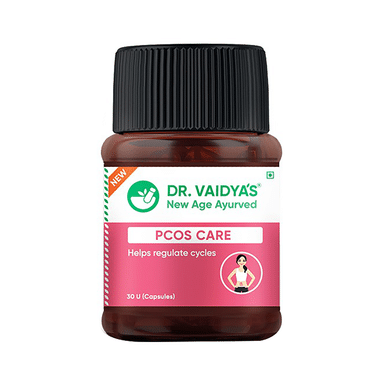Rs. 249
Rs. 399
38% off
Available in other variants

Product Details
Dr. Vaidya's PCOS Care Capsule (30 Each) is a unique Ayurvedic formulation that helps reduce PCOS symptoms. This Ayurvedic PCOS capsule is free from synthetic hormones. Instead, it contains 12 potent herbs that help improve female wellness by naturally restoring hormone balance.
Why Is PCOS Care Popular?
Key Ingredients:
Key Benefits:
Directions For Use:
Safety Information:
Why Is PCOS Care Popular?
Key Ingredients:
- Kanchanar Guggul: Helps support reproductive health
- Ashoka: Helps restore hormonal balance
- Shatavari: Helps maintain hormonal balance in women and revitalises the female reproductive system
- Methi: Helps improve overall health
- Daru Haridra: Helps control heavy bleeding and reduces PCOS symptoms like acne
- Latakaranj: Regulates hormone levels
- Punarnava: Helps manage hormonal imbalance in women
- Shatapushpa: Helps reduce inflammations caused by PCOS and improves overall female wellness
- Yashtimadhu: Helps regulate hormone levels and promotes healthy digestion
- Kumari (Aloe): Helps regulate cycles naturally
- Trikatu: Helps relieve indigestion and bloating caused by PCOS
- Gudmar: Helps maintain healthy blood sugar levels and reduces weight gain caused by PCOS
Key Benefits:
- Restores hormonal balance in women: Ashoka, Shatavari, Shatapushpa, and Kumari included in PCOS Care help regulate hormonal balance. Latakaranj, Kumari, Guduchi, and Yashtimadhu help support women's health. Kanchanar Guggul helps regulate the functioning of the thyroid gland to maintain the secretion of thyroid hormones. Thus, by maintaining hormonal balance, PCOS Care helps promote timely ovulation, get the monthly cycle naturally on time every month, and provides long-lasting relief from PCOS and other irregularities
- Relieves cramps, pain, and discomfort: The anti-inflammatory and antispasmodic properties of Kumari, Daruharidra included in the PCOS Care capsule help relieve cramps, pain, and discomfort during that time of the month
- Controls weight and blood sugar levels: Gudmar, Methi, Daruharidra, and Latakaranj decrease insulin resistance and help control blood sugar levels. Kanchanar guggul, Methi, and Trikatu improve metabolism and help reduce excess body weight
- Controls acne and unwanted hair growth: PCOS Care helps control acne and unwanted hair growth
- Supports reproductive and general health of women: Herbs in PCOS Care like Ashoka, Shatavari and Kumari have anti-inflammatory, antimicrobial, and antioxidant properties. They support uterine health and normal functioning of the reproductive system in women
- All-natural, non-hormonal formulation: PCOS Care is made from 100% natural, Ayurvedic herbs and does not contain synthetic hormones. It is not known to cause any side effects and hence, is safe for long-term use in recommended doses
- The capsule helps restore hormonal balance
- It can help control body weight and blood sugar levels
- It controls acne and unwanted hair growth
- The capsule helps relieve stress and anxiety and improves emotional health
- It revitalises the female reproductive system
- Free from synthetic hormones
- Safe for long-term use and can be taken even during monthly cycles
- Safe for blood sugar patients in recommended dosages
Directions For Use:
- For mild symptoms, take 1 capsule twice a day, after food, with warm water, for a minimum of 3 months
- In case of severe symptoms, take 2 capsules twice a day, after food, with warm water, for a minimum of 3 months
- Consult a healthcare professional for the correct dosage and duration to suit your condition
- Recommended duration: The time required to regularise monthly cycles varies from woman to woman and depends on various factors like severity of symptoms, other medical conditions etc.
- Take PCOS Care for a minimum of three months or as recommended by a healthcare professional
Safety Information:
- Store in a cool and dry place
- Keep out of reach of children
- Protect from direct sunlight












